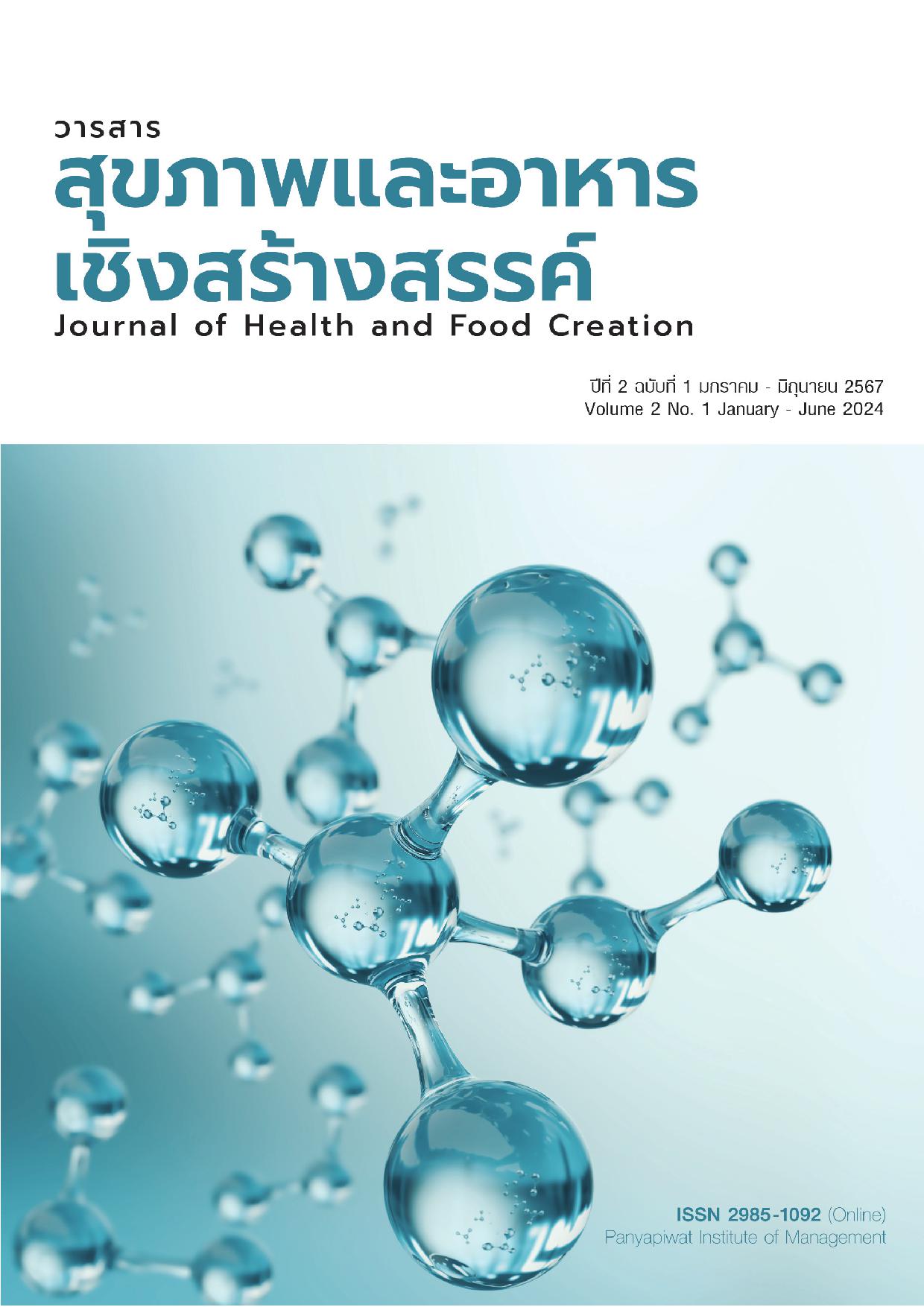ภาวะเบื่ออาหาร: สารอาหารสำหรับผู้ป่วยมะเร็งที่ได้รับยาเคมีบำบัด
คำสำคัญ:
ภาวะเบื่ออาหาร, สารอาหาร, ผู้ป่วยมะเร็ง, ยาเคมีบำบัดบทคัดย่อ
ผู้ป่วยมะเร็งที่ได้รับยาเคมีบำบัดจะมีความทุกข์ทรมานจากฤทธิ์ข้างเคียงของยาเคมีบำบัด อาการข้างเคียงที่พบมากคือ คลื่นไส้ อาเจียน มีแผลในปาก และท้องเสีย มีผลทำให้ผู้ป่วยรู้สึกเบื่ออาหาร รับประทานอาหารได้น้อยนํ้าหนักลด เมื่อเกิดขึ้นในระยะยาวผู้ป่วยอาจเกิดภาวะทุพโภชนการจนถึงภาวะผอมแห้ง การได้รับอาหารอย่างเพียงพอและครบถ้วนเป็นสิ่งสำคัญอย่างยิ่งสำหรับผู้ป่วยมะเร็งขณะได้รับยาเคมีบำบัดเพื่อเป็นการส่งเสริมร่างกายให้แข็งแรง พร้อมรับยาเคมีอย่างต่อเนื่องและต่อสู้กับโรคมะเร็งอย่างปลอดภัย สารอาหารที่จำเป็นที่ควรได้รับ ได้แก่ โปรตีน ไขมัน คาร์โบไฮเดรต นํ้า วิตามินและเกลือแร่ สารต้านอนุมูลอิสระ สารพฤษเคมี สมุนไพร อาหารว่างและอาหารเสริมสำเร็จรูปต่าง ๆ ดังนั้นบุคลากรสุขภาพและผู้ดูแลผู้ป่วยควรตระหนักถึงความสำคัญในการเตรียมและจัดหาอาหารอย่างเหมาะสมถูกต้องแก่ผู้ป่วยมะเร็งขณะได้รับยาเคมีบำบัด
เอกสารอ้างอิง
American Cancer Society. (2022). Nutrtion for person with cancer during treatment. American Cancer Society.
Chaisinghan, W. (2022, October 10). Anorexia after chemotherapy. Huachiew TCM Clinic. https://www.huachiewtcm.com/content/9176/%E0%B8%A0%E0%B8%B2%E0%B8%A7%E0%B8%B0%E0%B9%80%E0%B8%9A%E0%B8%B7%E0%B9%88%E0%B8%AD%E0%B8%AD%E0%B8%B2%E0%B8%AB%E0%B8%B2%E0%B8%A3%E0%B8%AB%E0%B8%A5%E0%B8%B1%E0%B8%7%E0%B9%80%E0%B8%84%E0%B8%A1%E0%B8%B5%E0%B8%9A%E0%B8%B3%E0%B8%9A%E0%B8%B1%E0%B8%94
Correia, M. I., & Waitzberg, D. L. (2003). The impact of malnutrition on morbidity, mortality, length of hospital stay and costs evaluated through a multivariate model analysis. Clinical Nutriton, 22(3), 235-239. https://doi.org/10.1016/s0261-5614(02)00215-7
de Souza, B. F., de Moraes, J. A., Inocenti, A., dos Santos, M. A., Silva, A. E., & Miasso, A. I. (2014). Women with breast cancer taking chemotherapy: Depression symptoms and treatment adherence. Revista Latino-Americana de Enfermagem, 22(5), 866-873. https://doi.org/10.1590/0104-1169.3564.2491
Deutz, N. E., Safar, A., Schutzler, S., Memelink, R., Ferrando, A., Spencer, H., Helvoort, A. V., & Wolfe, R. R. (2011). Muscle protein synthesis in cancer patients can be stimulated with a specially formulated medical food. Clinical Nutriton, 30(6), 759-768. https://doi.org/10.1016/j.clnu.2011.05.008
Dunkhunthod, B., & Sittisart, P. (2022). Antioxidant activity and cytotoxicity against human cancer cell lines of the Aqueous leaf extracts of Smilax luzonensis, Hoya kerrii and Derris elliptica. Science and Technology Journal Ubon Ratchathani University, 24(2), 1-11.
Ezeoke, C. C., & Morley, J. E. (2015). Pathophysiology of anorexia in the cancer cachexia syndrome. Journal of Cachexia, Sarcopenia and Muscle, 6(4), 287-302. https://doi.org/10.1002/jcsm.12059
Hariyanto, T. I., & Kurniawan, A. (2021). Appetite problem in cancer patients: Pathophysiology, diagnosis, and treatment. Cancer Treatment and Research Communication, 27, 100336. https://doi.org/10.1016/j.ctarc.2021.100336
Harvie, M. (2014). Nutritional supplements and cancer: Potential benefits and proven harms. American Society of Clinical Oncology Education Book, 34(1), e478-486. https://doi.org/10.14694/EdBook_AM.2014.34.e478
Jafari, A., Goudarzian, A. H., & Bagheri Nesami, M. (2018). Depression in women with breast cancer: A systematic review of cross-sectional studies in Iran. Asian Pacific Journal Cancer Prevention, 19(1), 1-7. https://doi.org/10.22034/apjcp.2018.19.1.1
Karomprat, A., Chaichan, P., Santawesuk, U., & Sookprasert, A. (2017). Symptoms, symptom management and outcome in cancer patients. Srinagarind Medical Journal, 32(4), 326-331.
Kim, J. Y., & Lim, K. H. (2023). Effects of vitamin intake on blood glucose in cancer patients undergoing chemotherapy: Quantitative and descriptive research. Korean Journal of Adult Nursing, 35(2), 148-157. https://doi.org/10.7475/kjan.2023.35.2.148
Liang, L. Q., Meng, L. L., Cai, B. N., Cui, Z. P., Ma, N., Du, L. H., Wei, Y., Qu, B. L., & Liu, F. (2021).Changes in the nutritional status of nine vitamins in patients with esophageal cancer during chemotherapy. World Journal of Gastroenterol, 27(19), 2366-2375. https://doi.org/10.3748/wjg.v27.i19.2366
Marx, W., Kiss, N., McCarthy, A. L., McKavanagh, D., & Isenring, L. (2016). Chemotherapy-induced nausea and vomiting: A narrative review to inform dietetics practice. Journal of the Academic Nutrition and Dietetics, 116(5), 819-827. https://doi.org/10.1016/j.jand.2015.10.020
Mazzotta, P., & Jeney, C. M. (2009). Anorexia-cachexia syndrome: A systematic review of the role of dietary polyunsaturated fatty acids in the management of symptoms, survival, and quality of life. Journal of Pain and Symptom Management, 37(6), 1069-1077. https://doi.org/10.1016/j.jpainsymman.2008.06.005
Muscaritoli, M., Lucia, S., Farcomeni, A., Lorusso, V., Saracino, V., Barone, C., Plastino, F., Gori, S.,Magarotto, R., Carteni, G., Chiurazzi, B., Pavese, I., Marchetti, L., Zagonel, V., Bergo, E.,Tonini, G., Imperatori, M., Iacono, C., Maiorana, L., … & Marchetti, P. (2017). Prevalence of malnutrition in patients at first medical oncology visit: The PreMiO study. Oncotarget,8(45), 79884-79896. https://doi.org/10.18632/oncotarget.20168
Nishikawa, H., Goto, M., Fukunishi, S., Asai, A., Nishiguchi, S., & Higuchi, K. (2021). Cancer cachexia: Its mechanism and clinical significance. International Journal of Molecular Sciences, 22(16), 8491. https://doi.org/10.3390/ijms22168491
Özkan, İ., Taylan, S., Eroğlu, N., & Kolaç, N. (2022). The relationship between malnutrition and subjective taste change experienced by patients with cancer receiving outpatient chemotherapy treatment. Nutrition and Cancer, 74(5), 1670-1679. https://doi.org/10.1080/01635581.2021.1957485
Palang, C., & Nunuan, P. (2020). Social support and adaptation of cancer patients receiving services at the national cancer institute: Case study research. Thai Cancer Journal,40(2), 62-75. [in Thai]
Prado, C. M., Baracos, V. E., McCargar, L. J., Reiman, T., Mourtzakis, M., Tonkin, K., Mackey, J. R.,Koski, S., Pituskin, E., & Sawyer, M. B. (2009). Sarcopenia as a determinant of chemotherapy toxicity and time to tumor progression in metastatic breast cancer patients receiving capecitabine treatment. Clinical Cancer Researcg, 15(8), 2920-2926. https://doi.org/10.1158/1078-0432.Ccr-08-2242
Puchalski, C. M. (2012). Spirituality in the cancer trajectory. Annals of Oncology, 23(Suppl 3),49-55. https://doi.org/10.1093/annonc/mds088
Sasaki, H., Tamura, K., Naito, Y., Ogata, K., Mogi, A., Tanaka, T., Ikari, Y., Masaki, M., Nakashima, Y., & Takamatsu, Y. (2017). Patient perceptions of symptoms and concerns during cancer chemotherapy: ‘Affects my family’ is the most important. Internationl Journal of Clinical Oncology, 22(4), 793-800. https://doi.org/10.1007/s10147-017-1117-y
Silva, F. R., de Oliveira, M. G., Souza, A. S., Figueroa, J. N., & Santos, C. S. (2015). Factors associated with malnutrition in hospitalized cancer patients: A croos-sectional study. Nutriton Journal, 14, 123. https://doi.org/10.1186/s12937-015-0113-1
Simard, S., Thewes, B., Humphris, G., Dixon, M., Hayden, C., Mireskandari, S., & Ozakinci, G. (2013). Fear of cancer recurrence in adult cancer survivors: A systematic review of quantitative studies. Journal of Cancer Survivorship, 7(3), 300-322. https://doi.org/10.1007/s11764-013-0272-z
ดาวน์โหลด
เผยแพร่แล้ว
รูปแบบการอ้างอิง
ฉบับ
ประเภทบทความ
สัญญาอนุญาต
ลิขสิทธิ์ (c) 2024 วารสารสุขภาพและอาหารเชิงสร้างสรรค์

อนุญาตภายใต้เงื่อนไข Creative Commons Attribution-NonCommercial-NoDerivatives 4.0 International License.
“ข้าพเจ้าและผู้เขียนร่วม (ถ้ามี) ขอรับรองว่า บทความที่เสนอมานี้ยังไม่เคยได้รับการตีพิมพ์และไม่ได้อยู่ระหว่างกระบวนการพิจารณาลงตีพิมพ์ในวารสารหรือแหล่งเผยแพร่อื่นใด ข้าพเจ้าและผู้เขียนร่วมยอมรับหลักเกณฑ์การพิจารณาต้นฉบับ ทั้งยินยอมให้กองบรรณาธิการมีสิทธิ์พิจารณาและตรวจแก้ต้นฉบับได้ตามที่เห็นสมควร พร้อมนี้ขอมอบลิขสิทธิ์บทความที่ได้รับการตีพิมพ์ให้แก่สถาบันการจัดการปัญญาภิวัฒน์หากมีการฟ้องร้องเรื่องการละเมิดลิขสิทธิ์เกี่ยวกับภาพ กราฟ ข้อความส่วนใดส่วนหนึ่งและ/หรือข้อคิดเห็นที่ปรากฏในบทความข้าพเจ้าและผู้เขียนร่วมยินยอมรับผิดชอบแต่เพียงฝ่ายเดียว”






